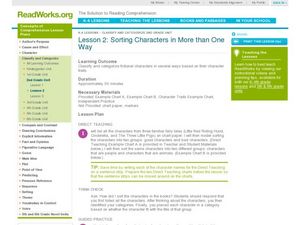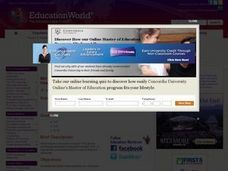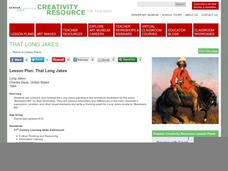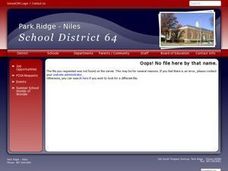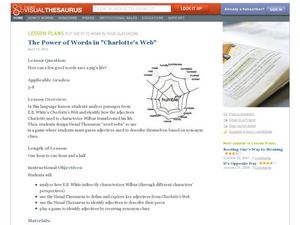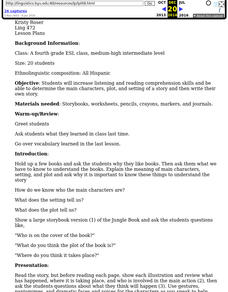Curated OER
Descriptive Writing Using the Book Rumpelstiltskin
Use the fairy tale Rumpelstiltskin to teach your third grade class about descriptive writing. Following a teacher read-aloud of the story, the class brainstorms a list of adjectives describing the main character. Students use this list...
Curated OER
Sorting Characters in More Than One Way
Introduce your class to characterization. Familiar story characters are sorted into "good" and "bad" categories based on the characters' personalites and actions in the story. The class discusses and describes characters they have read...
Classroom Adventures Program
Creating Characters
Examine character in depth. Over the course of these six lessons, learners explore their own character traits, determine the traits of characters in the books they read, practice comparing and contrasting, and collaborate in small...
Curated OER
Noisy Nora, Studious Students: Story Elements
Alliterative adjective nicknames generate stories inspired by Rosemary Wells' book Noisy Nora (also a thematic complement to any class with children who make a ruckus to get attention). Class members explore basic story elements --...
Roald Dahl
Matilda - The Weekly Test
Readers take the main characters in Matilda and individually describe them through a mnemonic. To get there, group members create an acrostic poem describing the character they were given, and choose one of the words from the...
Curated OER
Stir Up a Character Analysis Recipe
What ingredients make up a character? A cup of honesty, a dash of humor, a pinch of cynicism? Based on real cookbooks they review in class, learners at any grade level three and up write recipes to describe characters familiar to your...
Curated OER
Lesson: That Long Jakes
Cross-media analysis takes time and attention to detail. The class analyzes the painting Long Jakes and the poem "Backward Bill." They pay attention to the similarities and differences in each piece, looking for details that describe the...
Curated OER
Chatty Cherry Stories
Young artists will respond to reading children's literature, by engaging in original storytelling and representing their own images through the visual arts. Then they orally describe details of people, places, and things in their stories...
Curated OER
Understanding Characters
Learners analyzing characters from a story by creating an article about one. In this story analysis lesson, students read Charlie and the Chocolate Factory by Roald Dahl, and pick one character to write descriptively about....
Curated OER
Chain Together A Book Report
Individuals examine a book's components, including key events, characters, and vocabulary and develop "chain book reports" with their peers. Strips of paper containing the book's important events are staples together and hung.
Curated OER
An Author Study on Kevin Henkes
To better understand how the author Kevin Henkes uses the theme of friendship throughout his books, learners engage in several compare and contrast activities. The class reads several Henkes titles and discusses the similarities in...
Curated OER
Animation Pre-Production
Does your class love reading cartoons? Use their talents and interests to examine the process of writing a story they wish to tell through a cartoon. They develop the beginning, middle, and end of a story based on their original...
Curated OER
Using Evidence to Describe a Character
It's all about the details found in the text, when children attempt to describe the main character from the story, Burnt Toast on Davenport Street. They first discuss the process by which one would go about using textual...
Curated OER
CREATING A CHARACTER TRAIT MOBILE FROM THE OPERA THE LITTLE PRINCE
Students create a mobile that includes each of the six planets. They list the character traits of each of the characters from the six planets visited by the Prince. They present their project to the class and teacher.
Curated OER
The Power of Words in Charlotte's Web
"How can a few good words save a pig's life?" Posed with this question, your ELD students explore E.B. White's Charlotte's Web in a meaningful, valuable way. By analyzing specific word choice from the book, especially the excerpts...
Curated OER
Character Traits in Fables
Combining art, music, dance, and reading comprehension, this lesson is geared to reach all ability levels. After reading a variety of fables and discussing story elements and character traits, class members select a moral to use as the...
Curated OER
Describing Physical Appearance
For this ESL worksheet, students match adjectives that describe physical appearance to the appropriate body part. The second part of the worksheet requires students to complete sentence A based on the answer provided in sentence B.
Curated OER
It's in the Elements - Lesson Four
Students compare and contrast story elements in two versions of Cinderella. In this literature elements lesson plan, students are read two different versions of Cinderella, they identify the characters, plot, and setting, then they...
Curated OER
Learning to Analyze Characters
Learners discover writing strategies authors use to enhance characters. In this character writing lesson, students are read the Knuffle Bunny books by Mo Willems and analyze the story, characters and settings as they listen....
EngageNY
Close Reading of The Boy Who Loved Words: How Do People Build Their Word Power?
Third graders practice the skills of identifying the main message in a story, describing the main character, and sorting the key details of a story into specific categories. The story they read is, The Boy Who Loved Words. Using a...
Curated OER
Language Practice
The simple instructional techniques described in this plan will help young readers learn and practice basic reading skills and strategies. Before reading, introduce your readers to the meaning of main character, setting, and plot. Then...
Museum of Disability
Ian’s Walk and Apples for Cheyenne
Help young learners understand friendship and empathy with two reading comprehension lessons. Each lesson focuses on a story about a child with autism, and encourages readers to compare and contrast the characters to each other and to...
Roald Dahl
Matilda - Miss Honey and The Trunchbull
As the instructor reads aloud several quotes from five chapters of the story Matilda, class members mime their interpretation of the scenes. Then, after reading "Miss Honey" and "The Trenchbull" (chapters seven and eight), the...
Curated OER
Antagonist
Young learners explore the antagonist. They retell Hansel and Gretel and identify the witch and the stepmother as antagonists. They then brainstorm common character traits of an antagonist, and then write a paragraph describing...

